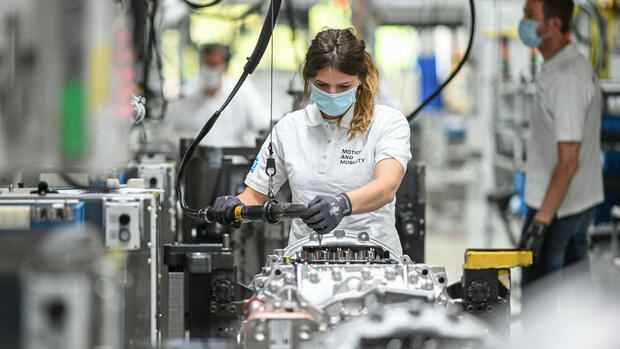Combustion engines and transmissions will hardly be needed in the future if cars are purely electric.
(Photo: dpa)
Brussels In Brussels there is often talk of a “just” change in the economy. But the way the EU’s climate protection program is currently structured, many Europeans will suffer from it, fears the association of European automotive suppliers Clepa. In a study he had it calculated how the conversion of car production to electric drives would affect the labor market.
The result: the number of employees will only grow until 2025, but then fall dramatically by 2035, when only electric cars will be allowed to be registered. Of the current 645,000 jobs in the industry, 501,000 would be lost. At the same time, 226,000 new jobs would be created. But these are not necessarily in the same company, often not even in the same country.
The authors of the study anticipate that many jobs will be cut, especially in Eastern Europe, but also in Germany. In Germany alone it would be 83,000. Italy would also be badly affected. In France, on the other hand, a particularly large number of battery factories could arise due to low energy prices, which would more than offset the negative effect there.
Suppliers are calling for climate protection to be technology-neutral. Strictly speaking, the laws proposed by the EU Commission meet this requirement. But in terms of their effect, they will hardly allow a market for internal combustion engines.
Top jobs of the day
Find the best jobs now and
be notified by email.
With its Green Deal, the Commission wants to stipulate that cars will no longer emit carbon dioxide (CO2) from 2035. The suppliers are calling for two changes to the law:
- Firstly, the CO2 emissions from car production should be included in the carbon footprint. That would be an advantage for internal combustion engines, which produce significantly less CO2.
- Second, automakers should buy e-fuels and mix them with petrol at filling stations. The CO2 saved as a result should be credited to their cars. Then the cars would continue to emit CO2, but it would be saved elsewhere.
The new federal government is also open to e-fuels, but not to admixtures in normal fuel. According to the coalition agreement, she wants to advocate “that verifiably only vehicles that can be refueled with e-fuels can be re-registered”. How this should be technically possible remains open.
Climate protectors against e-fuels in car engines
Many climate protectors reject e-fuels in car engines because the energy transition is already generating a huge demand for climate-neutral fuels. There are no alternatives for ships, aircraft and the chemical industry. Just supplying them will require immense investments.
In addition, energy is lost in the production of fuels. A car powered by e-fuels therefore consumes more electricity than a car powered directly by electricity.
The argument of the jobs contradicts this. Clepa General Secretary Sigrid de Vries said: “It is vital that we put automotive supplier jobs at the center of our efforts to address the social and economic impact of change.”
More: “It will only be sustainable with a new business model” – what will become of the filling stations in the electric age.
